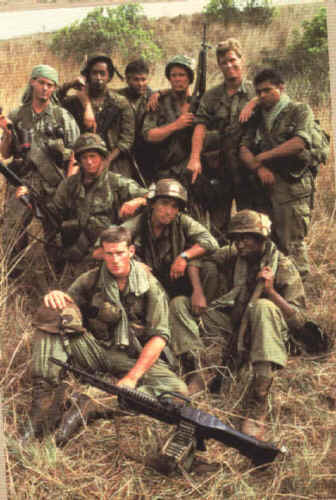
SATELLITE ORBIT - BOISE. ID
TAKING OFF
A review of TOUR OF DUTY
by David Gritten
Critics complain that TOUR OF DUTY , the
splendid new CBS prime-time drama about the Vietnam War , is not as compulsive or gripping
or powerful as the movies on the same subject.
They compare the TV show to Full Metal Jacket, Platoon and Full Metal
Jacket, and, on the face of it they are right.
Tour of Duty is blander than any of these films, as it skimps on some of the more gruesome,
unpalatable facets of the Vietnam experience. Nevertheless, its fate will undoubtedly
influence the nature of TV drama for years to come.
Unlike trendier shows such
as L.A.LAW and ST.ELSEWHERE, which leavens moments of high drama with black, frequently
gratuitous comedy, TOUR OF DUTY embodies conventional, straight-faced, straight-faced
story telling.
As in the movie PLATOON, we see the war from the point of view of the "grunts"-
the hapless foot soldiers who struggled daily to survive the sweaty, sticky hell of the
jungles and rice paddies, while those far removed from the front debated the war's
futility and morality.
The members of Bravo
Company comprises a cross-section of the American lives and outlooks. The captain has the
easy , aristocratic grace of an affluent upbringing, while the Jewish lieutenant
desperately tries to emulate his father's glorious military record. Among the grunts,
there are blacks and a haughtily proud Hispanic from the Bronx ; a young true-blue
patriot; a sunny , carefree surfer boy from California ; and a young , intense, conscientious
objector from Chicago who would rather play blues harmonica than fight.
Most importantly , there's Sergeant Zeke
Anderson, who's on his third tour of duty in 'Nam .Anderson played by Terence Knox, is the
Everyman of the series. We see the war mostly through his eyes ; his gaze is weary,
cynical, even a little disgusted. Yet he's the one who can best bring his soldiers safely
back from battle. He is responsible not only for the grunts, but for the succession of raw
lieutenants he must obey, even though his jungle smarts far out strip theirs.
Each solider dramatically represents a point of view about Vietnam . When Horne, the anti
- war protester tells Anderson …."It's an unjust war… …..America's
propping up a corrupt dictatorship, and I will not fight for that," Anderson not only
listens - he sends the soldier into combat. That may have been an unlikely response of the
time .As it is , it lets Horne become the show's mouthpiece of anti-war sentiment.
In battle , Horne kills a Viet cong
soldier which he does with reluctance and remorse to save his fellow men ."War is
wrong" he blurts out immediately " Maybe" Anderson replies, " but
that's not the point".
Through Anderson , we get the message of Tour of Duty: let others worry about the ethics
of this war, we're at the front line , and it's our job to stay alive until tomorrow.
The show's 8pm (ET) time dictates that none of the soldiers will be consorting too
explicitly with prostitutes, nor will foul language be predominant in the dialogue- its
not an option in prime time.
Tour of duty pulls its punches in other ways, too, averting its gaze from the seamier side
of military life in Vietnam. Instead of showing a lot of combat footage and bloodshed, the
series concentrates on the lives of those who fought the war and its effect on their
characters.
The viewers will ultimately decide whether Tour Of Duty's dramatic and middle of the road message can attract an audience of 40 million. But CBS is bravely gambling that it can ,and has sent the show right into the heart of darkness by slotting it opposite NBC's comedy blockbuster The Cosby Show.

It's a series about beleaguered men in an extra ordinary situation, but it presents its
issues in pro-foundly human terms. In the final analysis , the face of prime time
television in the next five years could hinge on how well Tour Of Duty performs.
BRAVO COMPANY